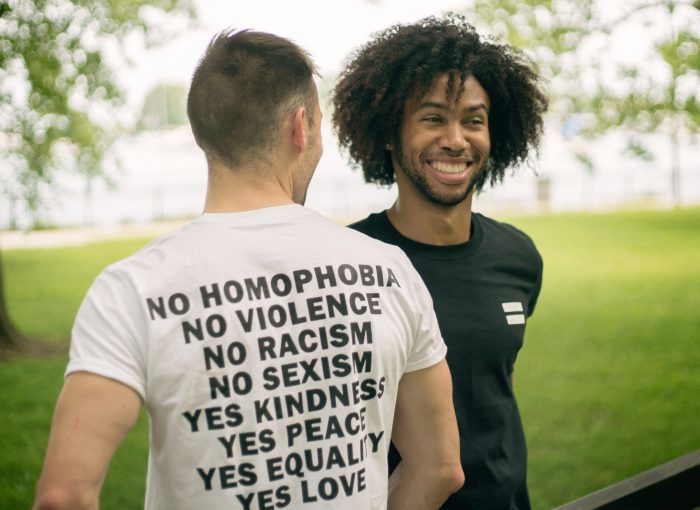By Alexia Sparks
Everyone, regardless of every factor that makes us different, has had to endure a great amount of change throughout the various events that have occurred since the beginning of last year. However, not all change is bad. I believe one of the most encouraging changes that have arisen from the ashes of 2020 is our increased awareness of one another. We are taking notice of our similarities as well as our differences, and this is a very positive effort.
Of course, we all know that we’re different, but this may be the first time we are seeing our differences acknowledged and celebrated. Although it may feel like we are more divided than ever, I believe that we are uniting as billions of remarkably different people. As we are coming together, we are also learning plenty about one another and what makes us all unique. The most important thing we can do for one another is to interact empathetically and create spaces for each person’s voice to be heard.
Among the most common Google searches of 2020 were topics like “how to donate to Black Lives Matter,” “how to help Yemen,” “protests near me,” and “virtual museum tours.” Disregard the fact that we also collectively searched “Elon Musk baby,” and you’ll find that the trends show that people were Googling incredibly uplifting things about how to better help those around us as our mindfulness of others increased. We were learning how to adapt, how to live even when it seemed impossible, and how to show up for one another in new ways. Better awareness of each other means celebrating our diversity and the matchless experiences of everybody.
Nobody has experienced the exact same thing in the exact same way, due to the many ways that we are fundamentally distinctive from one another. That is why we must put in the effort to stop assuming each other’s experiences, but to truly listen to them and appreciate them.
Imagine a conversation where a reporter talks over their interviewee the entire time. This is what I find we often do to one another. Rather than listen to how something impacted a friend or even a stranger, we make quick assumptions and limit the space for that person to share their perspective.
As poet Kalen Dion says, “encouraging someone to be entirely themselves is the loudest way to love them.”
This can apply to any relationship we have, but I believe it is especially true for how we interact with strangers. The best way to make space for everyone is to fully accept their ideas, their past, their perspective, and their truest identity. This encourages individuals to show up as their true selves, feeling that they have the space necessary to exist, and exist proudly.
Here at UCF, we have a very diverse community of students and faculty. There is not a pair of students here that have the exact same experience. UCF’S Office of Diversity and Inclusion very clearly says “our motto is simple: diversity includes all of us — all of the time.” Also according to UCF’S ODI, the Fall 2020 semester set records for diversity, with 48.5% of students identifying as minorities. We know that UCF is diverse and that there are many ways that we are all unique from one another. Therefore, our very school is a great place to start practicing creating space for each other and building these drawbridges across differences.
What are the benefits of allowing others’ voices to be heard?
To begin, there is room for more diversity when we give space to everybody’s voices. It can be easy to fill your inner circle with people who look, think, and act like you. But when we are intentionally spending time with people who differ from us, we can learn a lot. This can create better inclusivity for those who are yearning to be heard and seen.
There are plenty of different voices in the world—even within our UCF community. We have hundreds of thousands of students and professors, each different from the other. When we create space for each other to exist loudly and confidently, we are providing the needed environment for all people to step into their best selves, as they will no longer feel like they are not wanted, needed, seen, or heard.
How do we start?
The first step to creating room for everyone is to practice empathy. As defined by Psychology Today, empathy is “the ability to recognize, understand, and share the thoughts and feelings of another person.” Our “Nice post!” replies on discussion boards are proof that we already practice empathy. Next time you get the chance to participate in a class discussion, take particular notice of a perspective that varies drastically from your own. You don’t have to necessarily agree with it but recognizing the difference in opinion and understanding that it is just as valid as your own opinion is one way to breed empathy in your everyday life.
It isn’t enough to just say we are empathetic, though. We should really strive to practice it even when it’s hard: when we don’t want to reconcile our bitter feelings towards someone whom we oppose when we have too much homework to help a friend, or when our professors are not allowing us the extension we needed or the help we wanted. These moments are when it’s truly crucial to practice our empathy. When did we forget the cardinal rule of life that we learned as five-year-olds? Treat others how you would want to be treated. When we as individuals interact with understanding and kindness, our culture will become that of understanding and kindness too.
Ultimately, our arms should be open to everyone—not just our closest friends or those who align with our own personal beliefs and ideas. If you really want to start working out your empathetic muscles, start with the people who are harder for you to understand and reach a compromise with. Strike up a conversation with them without the goal of dominating the conversation or being “right”. Talk to them, hear them out, but really be listening. Even when we disagree with others, there is so much to learn from contrasting perspectives.
How can we as individuals create spaces where others can share their stories?
Sometimes creating space can be as simple as asking questions! When somebody shares how their day is going, don’t answer with a lazy response like “wow, that sounds terrible.” Instead, ask a question that provides extra space for their thoughts and feelings to be shared, like “That must have been hard. Do you want to talk more about it?” Or even “That seems really exciting, and I’d love for you to share your joy with me!” Imagine if someone said these to you. You would feel seen, heard, and accepted for exactly where you are in that moment. Show others that you care about what they have to say, by setting forth this example yourself.
Another way to create these spaces for others is to, again, practice empathy by putting yourself in other people’s shoes. Would you want to be talked over, or listened to? Would you want your answers to be assumed and dismissed, or would you want people to ask you deeper questions? Would you want to be brushed to the side, or truly listened to and understood? Our mission to understand one another can be as simple as thinking about how we would like to be understood.
It may conflict with our human nature, but the best way for us to build bridges for one other is to care less about ourselves and to care more about individuals. If we are hyper-focused on our own words in a discussion with another person, we would never learn anything or connect with anybody. When we care too much about how people perceive us, we often don’t stop to consider how we are showing up for others. But if we stay curious about each other and are striving to truly hear and understand the voices of everyone, our spaces will become less exclusive and more inclusive.
Admittedly, making the space for everyone is a difficult task, but it is worth the absolute best effort. There will be moments where it will not feel natural to empathize, but we can see these opportunities as means to practice this sense of empathy. In fact, we’ll be practicing it for as long as we’re coexisting with each other. But the payoff is worth it if we can provide the validation for everyone to exist unapologetically for exactly who they are.








